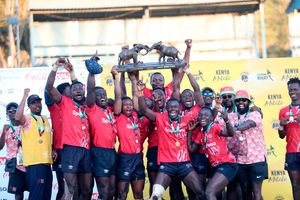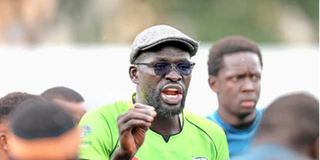
Lions coach Oliver Mang‘eni advice his players at half-time match against Rhinos during the Kenya Rugby Union Super Series Rugby tournament on May 4, 2024 at RFUEA grounds.
KCB have been a dominant team on the Kenya rugby scene winning multiple championships and producing outstanding players for the national team.
The club’s influence on the local game has now spread to coaching where many former players of the bank are increasingly being appointed to head elite clubs in the country.
The recent departure of Mark Mshila from KCB Rugby, where he was a player and then coach, to take charge at Mwamba is the latest appointment in a trend that is almost unprecedented.
Four of the head coaches and two assistant coaches now handling top Kenya Cup sides honed their skills at KCB.
They are Mshila (Mwamba), Paul “Pau” Murunga (Kenya Harlequin), Howard Okwemba (Kisumu), Oliver Mang’eni (KCB), Brian Nyikuli (South Coast Pirates) and Max Adaka (Kabras Sugar).
KRU Championship side Catholic Monks is coached by Simon Jawichre who is in fact, a founder member of KCB.
Jawichre is also the coach of Kenya Under-20.
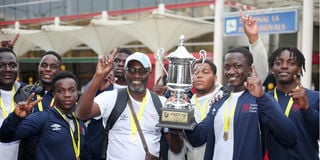
Kenya Under-20 rugby team "Chipu" head coach Simon Jawichre (left) with Captain Edmund Omondi display Barthes Trophy upon arrival at Jomo Kenyatta International Airport in Nairobi on April 29, 2024.
KCB has been unique in tapping into their own systems to fill in the void in case one of their coaches opted out.
When legendary Michael “Tank” Otieno, who encouraged and helped players get coaching certification, left the post of coach at KCB in 2011, former player Howard Okwemba took charge for one season before leaving in 2012.
Another former player Curtis Olago took charge of the coaching before departing at the end of last season.
One of his deputies, Mang’eni, 36,a former club lock forward, was elevated to head coach for the upcoming season.
Mshila as a player, joined KCB from Mwamba in 2001, featuring as a fullback before moving to Mombasa RFC in 2006 where he retired from competitively playing the game.
He returned to KCB in 2014 as a backs coach, a position he held until the Mwamba calling.
“KCB gave me a good foundation as a player and then as a coach and I want to take that rich expertise to Mwamba,” said Mshila, explaining that KCB has the best environment both for players and coaches.
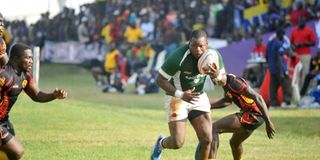
Kenya Simbas' Brian Nyikuli charges towards the Uganda Cranes defence during their Elgon Cup match on July 30, 2016 at RFUEA grounds.
At KCB, Mshila noted that every player is given an opportunity to showcase his talent and that technical knowledge isn’t a one-man show hence a collective responsibility.
“Having the team travel and train in places like South Africa is the best exposure a management can give players. It has always been an eye opener,” said Mshila, 44.
Okwemba, who played for KCB for a decade, from the time he cleared high school in 1998, first coached the club for a year before moving to Western Bulls for three seasons in Kenya Cup from 2015 to 2018.
Okwemba then moved to Kisumu Rugby Club for two seasons before being drafted by KRU Championship side South Coast Pirates in 2019, a season that was drastically interrupted by the Covid-19 pandemic.
Okwemba, is now back at Kisumu Rugby Club that will, incidentally, be making a return to Kenya Cup this season, says that he became a better player and coach at KCB. “The club really shaped my game under coach Tank,” said Okwemba.
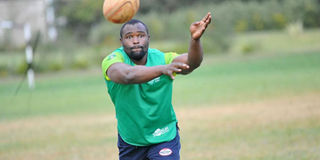
Max Adaka during a past training session. PHOTO | CHRIS OMOLLO |
The former utility back said that good development structures that are supported by KCB veteran players make every player coming to the Thika Superhighway side flourish.
“The structures support both players and technical bench,” said Okwemba, adding that the club’s management focuses on taking players to foreign ours and coaches for World Rugby courses has also enriched the team’s technical ability.
The giant Murunga played for KCB from 2005 to 2010 as a forward. He won the Kenya Cup in 2005, 2006 and as captain in 2007 before leaving for Homeboyz.
Murunga took charge at Homeboyz as head coach from 2011 to 2019, winning the Enterprise Cup in 2018 before Harlequin brought him on board in May 2022 to deliver their first National Sevens title this year after 12 years.
“My game grew at KCB where coach Tank had put in place good structures. He tapped in the best players from high school. I played alongside my age mates like Derrick Wamalwa, Andrew Amonde among others whom I had met in school tournaments,” said Murunga, who used to play as a lock and eighth man.

Kenya Harlequin F.C. head coach Paul Murunga during the interview in Nairobi on September 18, 2024.
The Quins coach explained that “Tank” Otieno was then Kenya Simbas coach, which meant that most good KCB players made it to the national team where they got more exposure.
“Most of the retiring players were infused to the technical bench and that saw the bankers’ culture being retained, a move that saw the club dominate during his time and recent years,” said Murunga.
Former player John Ojara, now citing commissioner, who briefly deputized Jawichre as KCB coach in 2008, says Tank conducted coaching courses for many players of the club.
Under Olago and the likes of Mang’eni and Mshila as his deputies, KCB won Kenya Cup in 2015 before back-to-back victories from 2017 to 2021.
Nyikuli joined KCB in 2016, having played for Impala from 2003 to 2009 and Quins 2010 to 2013. He also featured for Strathmore Leos as a player-cum-coach from 2013 to 2016.
Nyikuli, who won three Kenya Cup titles each with KCB and Quins and two with Impala reckoned that all the teams offered him something different. “However, it’s at KCB where I played a more structured rugby,” said Nyikuli, who has been South Pirates forward coach for the last three years. “It’s that elite level play and experience that I have brought to Pirates.”
The Coast-based club will feature in the Kenya Cup for the first time in their history this season.
"KCB is such a special place where players thrive because of the good environment where the management is keen on their welfare," said Nyikuli, 39.
Kenya Sevens strength and conditioning coach, Andrew Amonde and Kenya Lionesses 15/Sevens coach Dennis “Ironman” Mwanja are former KCB players.
Amonde hung his boots mid last year to take charge as KCB Sevens coach, propelling the team to the 2023 Kenya National Sevens Circuit victory.
Mwanja, who played for KCB from 2005 to 2014 as lock and centre, has served as the women’s national team coach since 2022.
Both Amonde, 40, and Mwanja, 43, double up as deputy coaches at KCB.
Adaka, who has played in 13 Kenya Cup finals, played for KCB for six years from 2009 to 2015, winning the Kenya Cup in 2015 before moving to Kabras to play a key role in their maiden Kenya Cup victory in 2016.
Adaka’s playing career ended in 2021 after a neck injury paralysed his right arm. He turned to coaching and had a three-month stint with Masinde Muliro University of Science and Technology before returning to Kabras Sugar as forwards coach to guide them to Kenya Cup and Enterprise Cup glory in 2022 and 2023.
Reminiscing on his days at KCB, Adaka, 35, who also played for Kenya Simbas from 2012 to 2017, said that what made the bankers standout was that they were more than teammates.
“We were a family and that made things fall in place in addition to hard work, teamwork and winning mentality,” said Adaka.
It is this culture that has made KCB players effortlessly transit to coaching, and their numbers as head coaches in Kenyan club rugby is a testament of the bank’s influence .

